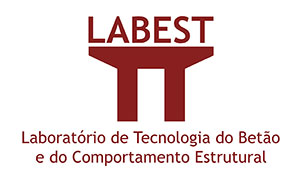LABEST is a group of the R&D CONSTRUCT unit integrating the network of research units qualified by the Portuguese Foundation for Science and Technology. Our activity is directed towards solving technical problems raised by industry, transferring know-how and advanced technology to the final users. You are invited to visit our website wherein you can find information about the mission, objectives, areas of interest, research and development and services provided. Innovative products and efficient solutions require the right partnership. Contact the partner, do not hesitate to put forward your questions.
Presentation
LABEST is a research group of the R&D CONSTRUCT unit, gathering a team with relevant expertise in material science and in structural behaviour applied to civil engineering construction. The known cooperation difficulties between specialists in construction materials and experts in structural modelling have been overcome by looking at civil engineering structures through a single magnifying lens, which has proven to be essential for a close interaction with the industry and for innovation in civil engineering products. The development of new and eco-efficient cementitious materials, the modelling of materials and structures for short and long term performances, the fire resistance and the structural health monitoring applied to civil infrastructures are topics of leading research of LABEST.
History
LABEST was founded in 2003 after the reorganisation of the research in Civil Engineering at the University of Porto. The aim was developing innovative work in the field of materials and structural behaviour of civil engineering constructions, in close cooperation with Industry. The scope of the group was directed towards providing formation to young researchers and solving technical problems raised by industry, transferring know-how and advanced technology to the final users. The unit uses the facilities and the lab areas within the Structural Concrete and Materials Testing Laboratories at the Faculty of Engineering of the University of Porto. In 2006 the Fire Laboratory at University of Aveiro was integrated in LABEST, expanding the corresponding intervention areas.
Objectives
In the national scientific scenario it is apparent the little research in the field of materials applied to the construction industry, despite the huge importance of this sector in the portuguese economy. Both in Portugal and internationally, specialists in material science lack the necessary knowledge of problems related to structures of civil engineering, and the structural engineers do not go deeper in the material behaviour and its application technology to construction. The integration of researchers developing activities in the area of materials, as well as researchers with expertise in the field of analysis and design of structures, allows for a consistent development of the R&D activities of LABEST. Therefore, the main objective of the scientific and innovative technological work to be carried out by the Unit consists in developing advanced eco-efficient materials (concrete and other structural materials) and new products regarding their sustainable application in construction, as well as modelling the behaviour of structures in support of their adequate design and long-term performance, taking into appropriate account issues like environment, economy, safety and durability. Through co-operation of specialists in materials, structural analysis and fire resistance, the Unit aims to support the needs of the construction industry and society. The substantial improvement of the laboratory facilities, including the acquisition of specialized equipment, has been an objective pursued by LABEST since its formation. A strong and consistent effort has been pursued by the team in order to equip the laboratories of Materials and Structures with the adequate facilities needed to carry out research of quality. It was felt the great importance of this objective to assure a better response to the industry needs, applying and transferring advanced technology. Also, improvement of the LABEST laboratory facilities was assumed as mandatory to develop new and more integrated PhD projects, contributing in an efficient manner to the post-graduation in this field.
Organisation
The LABEST has a Scientific Coordinator, responsible for the co-ordination and management of the available resources in the group.
